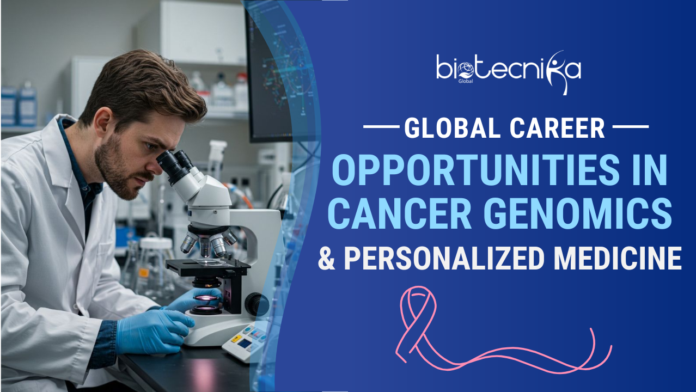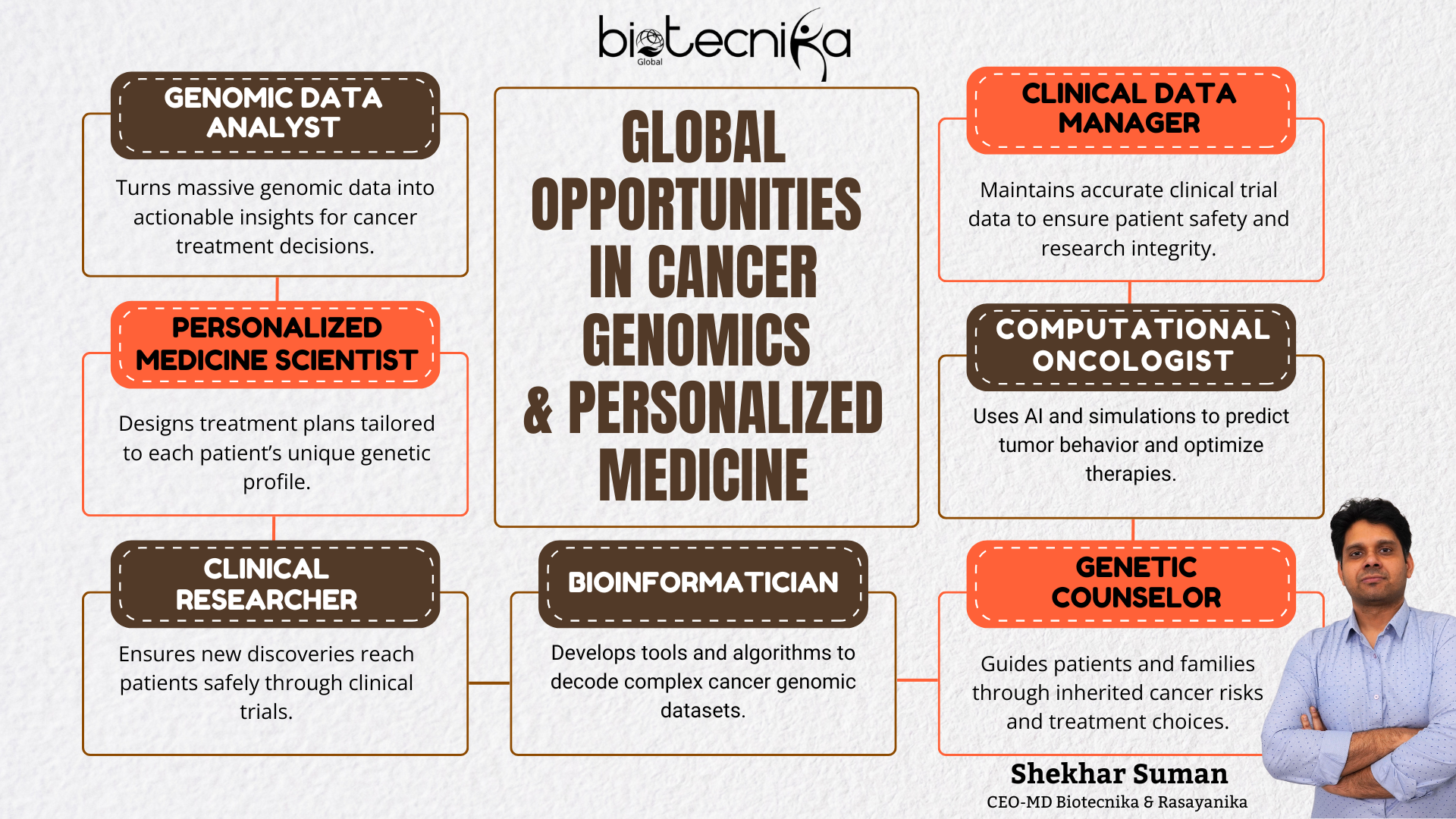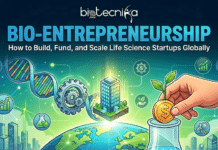Careers in Cancer Research: Global Opportunities in Cancer Genomics and Personalized Medicine
If you have ever wondered how science could move beyond “one-size-fits-all” treatments, you are not alone. Researchers, doctors, and thousands of students across the world are asking the same question: “How can we make cancer treatment more precise, personal, and effective?”
And that’s exactly what cancer genomics and personalized medicine are trying to achieve. Do you know what the most exciting part of this is? Well, let me reveal it to you. This revolution is not just about finding a cure for cancer. It’s also creating new careers in cancer research for students like you.
In this article, we will explore the global career landscape in cancer genomics and personalized medicine, from data-driven roles like Global Data Analysts and Bioinformaticians, to patient-centered paths like Genetic Counselors, and more. You will see how your skills can fit into this fast-growing field. And most importantly, you will learn how to take your first step, no matter where you are in your academic journey.
1. Genomic Data Analyst: Turning Big Data into Insights
We know that every genome that we sequence generates terabytes of raw data. It holds the secrets behind how cancer develops and how it can be treated. Genomic Data Analysts are one of the careers in cancer research. They reveal the hidden mysteries to the world.
What do they do?
A qualified analyst cleans, processes, and interprets sequencing data. They work with variant detection, mutation patterns, and statistical models that help oncologists make sense of patient samples.
Why do they matter?
Their work often determines whether a patient is receiving the right drug at the right time or not.
Careers in Cancer Research Pathway:
As a UG student, you can begin by building strong foundations in statistics, R/ Python, and bioinformatics tools. Alternatively, if you are a postgraduate student, you can pursue advanced training in machine learning and cancer-specific genomics pipelines.
2. Personalized Medicine Scientist: Designing Tailored Treatments
Imagine walking into a clinic where your treatment plan is built not for “patients like you,” but only for you. These professionals are the hidden warriors behind the personalized treatments.
What do they do?
The scientists design therapies based on each patient’s genetic material. They combine lab science with the patient data. They work with clinicians to guide their decisions on immunotherapy, targeted therapy, or drug combinations.
Why do they matter?
They stand at the crossroads of lab bench and bedside, making research truly personal.
Career Pathway:
As a UG student, you should focus on molecular biology and genetics to become a Personalized Medicine Scientist. If you are a PG student, focus on pharmacogenomics, translational medicine, and regulatory science.
3. Clinical Researcher in Oncology Genomics: Frontline Careers in Cancer Research
We all know that drugs don’t reach patients overnight. They must undergo lengthy and tedious processes for years. They have to clear hundreds of clinical tests before they reach the public. Researchers make sure these trials reflect genetic diversity and patients’ needs.
What do they do?
These professionals design and manage clinical studies focusing on cancer patients and their specific genetic profiles. They monitor trial safety, patient recruitment, and regulatory compliance.
Why do they matter?
The researchers bridge the lab with the clinic. They ensure that every new discovery reaches the public and doesn’t remain locked in research journals.
Career Pathway:
To build a strong careers in oncology research as a UG student, you can start by working as a research assistant or trial coordinator. As a PG student, you can aim for advanced roles in trial design or regulatory leadership.
4. Bioinformatician: The Architects of Digital Biology
I’m sure you must have seen or read about the fastest-growing field of science called Bioinformatics. These bioinformaticians are the real architects of today’s cancer genomics research across the world. They are drawing the blueprint of cancer genomics.
What do they really do?
These masterminds of science develop algorithms and software that allow us to visualize, query, and compare the massive genomic datasets. They are pushing the field forward with their innovations, such as building cancer mutation databases and developing AI-driven diagnostic tools.
Why are they important?
Do you know that without them, the genomic data will just remain like a piece of an unreadable puzzle? They play an important role in breaking down the complex genomic data.
Career Pathway:
If you are a graduate student, you should gain practice coding skills like Python, R, and Bash, and understand biological databases. You can explore specialized fields like structural bioinformatics or AI in oncology in your master’s.
5. Genetic Counselor: Patient-Centered Careers in Cancer Genomics
What if you had an expert who could help you understand the complex genetic disorders? What if you had someone who could guide you through the inherited cancer and its treatment? Inherited cancer has been a major issue, and a Genetic counselor helps people to battle against it.
What do they actually do?
In simple words, they explain the complex test results to patients in plain language. They help the families suffering from inherited cancer in understanding the risks, and guide them through decisions, and provide emotional support.
What’s their importance?
In this toughest battle against cancer, they provide the “human touch”. They ensure that the patient feels empowered and not overwhelmed.
Career Pathway:
If you want to become a Genetic Counselor, then you must build strong communication and psychological skills along with life science knowledge. In your master’s, you can pursue certification programs in genetic counseling.
6. Computational Oncologist: AI-Powered Careers in Cancer Research
This job title may feel futuristic. But this is one of the most important and impactful careers in cancer research. With the advancing technology, you can now win a battle against cancer.
What do they do?
The Computational Oncologist uses advanced modeling, simulations, and AI to predict how tumors evolve. They study how they might resist treatments. With this they often work in high-tech research labs and institutes. They play an important role in pharmaceutical R&D teams.
Why do they matter?
We all know about the trial and error that we have in our field. These oncologist and their models can save years of efforts that our researchers put into this trial and error. They can forecast the treatment outcomes even before they happen.
Career Pathway:
To become a Computational Oncologist, you need coding skills and math, along with your UG degree. If you are a PG student, then focus on concepts such as computational biology, physics, and applied mathematics, along with life science and oncology.
7. Clinical Data Manager: Behind-the-Scenes Careers in Oncology Trials
With the latest boost to the clinical research field, you must have seen lots of new careers in cancer research. Do you know that every clinical trial runs on data, patient records, lab results, and drug safety reports? If these are not managed well, then the entire study can fail.
What do they do?
Managers make sure trial data is collected, stored, and analyzed accurately. They work with electronic data capture systems, ensuring global compliance standards are met.
Why do they matter?
Their accuracy helps the healthcare and biotech industries protect patient safety. They make sure that every new drug is safe and effective.
Career Pathway in Cancer Research:
You can start your career in cancer research as a data entry or trial assistant with your BS degree. With your MS degree, you can move to higher leadership roles managing international studies.
Skills Needed Across Careers in Cancer Research
- Foundational Knowledge: You have to build a strong foundation in Genetics, Molecular Biology, and Statistics.
- Technical Skills: To excel in your career in cancer research, you must have skills like coding, data visualization, and genomics.
- Soft Skills: To stand out from the rest, gain soft skills like communication, teamwork, and critical thinking.
- Global Readiness: Be aware of regulatory landscapes (FDA, EMA, ICMR) and ethics. This will help you in landing better opportunities.
Global Career Opportunities in Cancer Genomics
| Region | Key Highlights | Career Opportunities |
| North America | Home to leading biotech hubs and cancer research centers (e.g., Boston, San Diego). | Roles in precision oncology research, pharma R&D, biotech startups, and clinical genomics labs. |
| Europe | Strong EU-backed personalized medicine initiatives; focus on research + patient care. | Careers in genomics research institutes, hospital-based genomic medicine, and EU-funded projects. |
| Asia-Pacific | Fastest-growing genomics market with heavy investments in India, China, Singapore, and Japan. | Jobs in genomics infrastructure, biotech R&D, and AI-driven cancer research. |
| Developing Regions | Rising interest in affordable and accessible cancer genomics is often linked to public health. | Opportunities in non-profits, NGOs, and public health genomics; focus on equity and access. |
Final Thoughts: Why You Should Explore Careers in Cancer Research?
Cancer is one of the greatest battles that the human body is fighting against. But unlike in the past, now we have new and advanced tools. With these, our researchers are now rewriting the future of cancer treatment.
For Life Science students, this is more than just a career path in oncology research. It is an invitation to join the global community fighting against cancer. Whether you are dreaming about crunching genomic data, guiding patients through tough decisions, or designing the next innovative therapy, ther is a role for you in this battle.
And do you know what the best part is? Well, you don’t have to wait until you “know everything” to start. Small steps, such as learning coding, joining a research internship, or taking up an online genomics course, can help you get started with your journey. The journey that will lead you towards a real change.
The future of cancer research will be written by scientists who can combine data with compassion. The one who can blend technology with humanity. So, why not let one of those scientists be you?
Start today, because the fight against cancer needs the next generation of thinkers like you.







